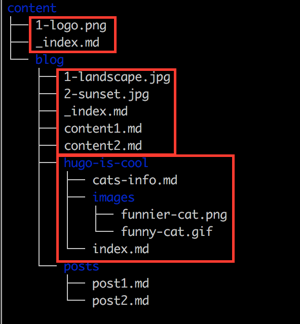Content Organization
Page Bundles
Hugo 0.32 announced page-relative images and other resources packaged into Page Bundles.
These terms are connected, and you also need to read about Page Resources and Image Processing to get the full picture.

Organization of Content Source
In Hugo, your content should be organized in a manner that reflects the rendered website.
While Hugo supports content nested at any level, the top levels (i.e. content/<DIRECTORIES>) are special in Hugo and are considered the content type used to determine layouts etc. To read more about sections, including how to nest them, see sections.
Without any additional configuration, the following will automatically work:
.
└── content
└── about
| └── index.md // <- https://example.com/about/
├── posts
| ├── firstpost.md // <- https://example.com/posts/firstpost/
| ├── happy
| | └── ness.md // <- https://example.com/posts/happy/ness/
| └── secondpost.md // <- https://example.com/posts/secondpost/
└── quote
├── first.md // <- https://example.com/quote/first/
└── second.md // <- https://example.com/quote/second/
Path Breakdown in Hugo
The following demonstrates the relationships between your content organization and the output URL structure for your Hugo website when it renders. These examples assume you are using pretty URLs, which is the default behavior for Hugo. The examples also assume a key-value of baseURL = "https://example.com" in your site’s configuration file.
Index Pages: _index.md
_index.md has a special role in Hugo. It allows you to add front matter and content to your list templates. These templates include those for section templates, taxonomy templates, taxonomy terms templates, and your homepage template.
You can create one _index.md for your homepage and one in each of your content sections, taxonomies, and taxonomy terms. The following shows typical placement of an _index.md that would contain content and front matter for a posts section list page on a Hugo website:
. url
. ⊢--^-⊣
. path slug
. ⊢--^-⊣⊢---^---⊣
. filepath
. ⊢------^------⊣
content/posts/_index.md
At build, this will output to the following destination with the associated values:
url ("/posts/")
⊢-^-⊣
baseurl section ("posts")
⊢--------^---------⊣⊢-^-⊣
permalink
⊢----------^-------------⊣
https://example.com/posts/index.html
The sections can be nested as deeply as you want. The important thing to understand is that to make the section tree fully navigational, at least the lower-most section must include a content file. (i.e. _index.md).
Single Pages in Sections
Single content files in each of your sections will be rendered as single page templates. Here is an example of a single post within posts:
path ("posts/my-first-hugo-post.md")
. ⊢-----------^------------⊣
. section slug
. ⊢-^-⊣⊢--------^----------⊣
content/posts/my-first-hugo-post.md
When Hugo builds your site, the content will be output to the following destination:
url ("/posts/my-first-hugo-post/")
⊢------------^----------⊣
baseurl section slug
⊢--------^--------⊣⊢-^--⊣⊢-------^---------⊣
permalink
⊢--------------------^---------------------⊣
https://example.com/posts/my-first-hugo-post/index.html
Paths Explained
The following concepts provide more insight into the relationship between your project’s organization and the default Hugo behavior when building output for the website.
section
A default content type is determined by the section in which a content item is stored. section is determined by the location within the project’s content directory. section cannot be specified or overridden in front matter.
slug
A content’s slug is either name.extension or name/. The value for slug is determined by
- the name of the content file (e.g.,
lollapalooza.md) OR - front matter overrides
path
A content’s path is determined by the section’s path to the file. The file path
- is based on the path to the content’s location AND
- does not include the slug
url
The url is the relative URL for the piece of content. The url
- is based on the content item’s location within the directory structure OR
- is defined in front matter, in which case it overrides all the above
Override Destination Paths via Front Matter
Hugo assumes that your content is organized with a purpose. The same structure that you use to organize your source content is used to organize the rendered site. As displayed above, the organization of the source content will be mirrored at the destination.
There are times when you may need more fine-grained control over the content organization. In such cases, the front matter field can be used to determine the destination of a specific piece of content.
The following items are defined in a specific order for a reason: items explained lower down in the list override higher items. Note that not all items can be defined in front matter.
filename
filename is not a front matter field. It is the actual file name, minus the extension. This will be the name of the file in the destination (e.g., content/posts/my-post.md becomes example.com/posts/my-post/).
slug
When defined in the front matter, the slug can take the place of the filename in the destination.
---
title: A new post with the filename old-post.md
slug: "new-post"
---This will render to the following destination according to Hugo’s default behavior:
example.com/posts/new-post/
section
section is determined by a content item’s location on disk and cannot be specified in the front matter. See sections for more information.
type
A content item’s type is also determined by its location on disk but, unlike section, it can be specified in the front matter. See types. This can come in especially handy when you want a piece of content to render using a different layout. In the following example, you can create a layout at layouts/new/mylayout.html that Hugo will use to render this piece of content, even in the midst of many other posts.
---
title: My Post
type: new
layout: mylayout
---url
A complete URL can be provided. This will override all the above as it pertains to the end destination. This must be the path from the baseURL (starting with a /). url will be used exactly as it is defined in the front matter, and will ignore the --uglyURLs setting in your site configuration:
---
title: Old URL
url: /blog/new-url/
---Assuming your baseURL is configured to https://example.com, the addition of url to the front matter will make old-url.md render to the following destination:
https://example.com/blog/new-url/
You can see more information on how to control output paths in URL Management.